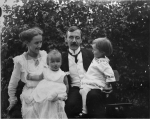Meet Karl Barth
– by Absalon Alvarez
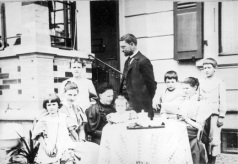
Karl Barth’s Childhood Family
Karl Barth was born on May 10th, 1886.
He was the first child of Anna Katharina Barth and Friz Barth. His father was a Swiss Reformed professor of New Testament.
A troublesome child, Barth didn’t like going to school and for some time was the leader of a local street gang, engaging in feuds at school and in the neighborhood. (In the this family picture, Barth had just been disciplined by his father).
In 1904 Barth set out to follow in the footsteps of his father and started to study theology at the University of Bern. Later on he continued his studies in Germany at the universities of Berlin, Tübingen and Marburg. His school of thought was in Liberalism, and his approach to ministry in his early years was that of social gospel. While studying, he was also involved in social justice causes, including advocating for workers’ rights.
In 1909, Barth became a Pastor in Geneva, and then in Fafenwill in 1911, where he served for a decade. In Safenwill is where Barth met his wife, Nelly Hoffman, and married in 1913.
Barth continued to be extremely involved in social work since, which was in line with his influences throughout seminary. These included such liberal scholars as Wilhelm Herrmann (idealist) and Adolf Von Harnack (social gospel).
The Manifesto of the Ninety-Three was a letter signed by 93 German intellectuals, from many academic areas such as science, math, arts, and theology. They signed this proclamation endorsement in support of the German military actions in the beginning of WWI. This is believed to have been the cause of Barth’s disillusionment with his professors, many of whom signed it. He believed that the lack of morals in their theology allowed them to be influenced to fit the political movements of that time.
Torn by the way liberal theology was shifting, and was being used and influenced by secular leaders, Barth decided to rethink his theological understandings. A visit with preacher Christoph Blumhardt seems to have motivated Barth to begin a journey to understand and do theology differently. Blumhardt’s understanding was that “the call of the Christian is still for him to give himself completely to the cause of the kingdom; to do everything in his power to help the world toward that goal. Yet, at the same time, a Christian must remain calm and patient, unperturbed even if his efforts show no signs of success, willing to wait for the Lord to bring the kingdom at his own pace and in his own way.” Blumhardt’s influence encouraged Barth to begin his theological work, and to begin writing.
In 1916 Barth decided to write a commentary on Paul’s epistles to the Romans. Published in 1919, it was intended for his own use, and for a small circle of friends. Instead, this work landed like a bombshell in the theological arena.
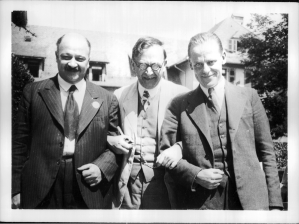 His commentary brought to life certain subjects that had been muted by liberal theology. Barth wrote vigourously of the victorious resurrection of Jesus Christ. This would be central to his thoelogy from this time onward. In particular, he clearly lays out the radicalness of the Gospel. “Faith is awe in the presence of the divine incognito; it is the love of God that is aware of the qualitative difference between God and man and God and the world.”
His commentary brought to life certain subjects that had been muted by liberal theology. Barth wrote vigourously of the victorious resurrection of Jesus Christ. This would be central to his thoelogy from this time onward. In particular, he clearly lays out the radicalness of the Gospel. “Faith is awe in the presence of the divine incognito; it is the love of God that is aware of the qualitative difference between God and man and God and the world.”
Because Barth’s commentary received international attention, he was offered a job at the University of Goettingen in 1921.
1927 Barth’s theological journey moved to a different set of topics, which would become the collection of writings we know today as Church Dogmatics. One of Barth’s key theological themes in Dogmatics, his emphasis on the Word of God, is expressed in this quote: “The object of theology is not Christian faith, but the word of God.” Barth had become convinced that the Christian theology had granted too much to philosophy. So he declared that the Word of God provides not only answers, but also questions. “The gospel is not a truth among other truths. Rather, it sets a question mark against all truths.”
Barth’s work mirrored earlier theological traditions of freedom and critical stance towards the task of theology. He insisted, however, that no matter how true or correct theology was, it always remains a human endeavor, and therefore must always be seen with a combination of freedom, joy, and even humor.
In that time that many people believed that theological systems were a thing of the past. Church Dogmatics showed there was still room and value for systematic theology. For many, Barth’s theology served as an antidote for liberalism.
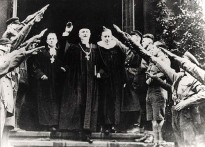 During the rise of Adolf Hitler’s Nazi Party in 1933, the German church struggled against the belief of so-called “German Christians” who believed in the perfectibility of the human race. This conviction, which was rooted in natural theology, had become part of Hitler’s political agenda for the Third Reich. It was believed that the German church had a divine calling to reinterpret Christianity, particularly in terms of opposing Judaism. This gave credence to the establishing of numerous anti-Semitic policies.
During the rise of Adolf Hitler’s Nazi Party in 1933, the German church struggled against the belief of so-called “German Christians” who believed in the perfectibility of the human race. This conviction, which was rooted in natural theology, had become part of Hitler’s political agenda for the Third Reich. It was believed that the German church had a divine calling to reinterpret Christianity, particularly in terms of opposing Judaism. This gave credence to the establishing of numerous anti-Semitic policies.
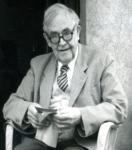 In protest, Barth and others gathered in the city of Barmen for what they called “ the witnessing synod.” The fruit of their meeting was what is known as tthe Barmen Declaration, written by mostly Barth. This meeting and declaration gave rise to what is known as “the Confessing Church”, the movement eventually led in part by Dietrich Bonhoeffer. In the years ahead, they would start an underground movement, and even make plans to assasinate Hitler.
In protest, Barth and others gathered in the city of Barmen for what they called “ the witnessing synod.” The fruit of their meeting was what is known as tthe Barmen Declaration, written by mostly Barth. This meeting and declaration gave rise to what is known as “the Confessing Church”, the movement eventually led in part by Dietrich Bonhoeffer. In the years ahead, they would start an underground movement, and even make plans to assasinate Hitler.
After the WWII, Barth’s influenced remained considerable. He served as an important voice for the German church in their attempts for reconciliation with church bodies around the world. And, though he didn’t embrace a Fundamentalist understanding of the infallibility of the word of God (he believed in the infallibility of Jesus Christ, revealed in the Word), he modeled how a high regard for the scriptures could still be legitimately held in modern theological studies. Even though Barth died in December 10, 1968, his legacy and impact continue to have influence in theology today.
